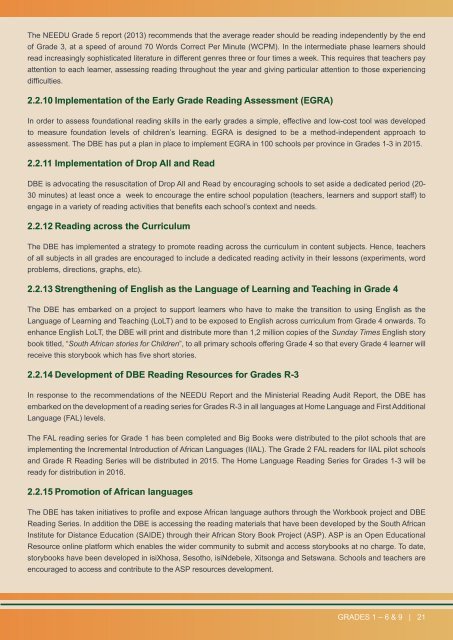REPORT ON THE ANA OF 2014
REPORT ON THE ANA OF 2014
REPORT ON THE ANA OF 2014
- No tags were found...
Create successful ePaper yourself
Turn your PDF publications into a flip-book with our unique Google optimized e-Paper software.
The NEEDU Grade 5 report (2013) recommends that the average reader should be reading independently by the endof Grade 3, at a speed of around 70 Words Correct Per Minute (WCPM). In the intermediate phase learners shouldread increasingly sophisticated literature in different genres three or four times a week. This requires that teachers payattention to each learner, assessing reading throughout the year and giving particular attention to those experiencingdifficulties.2.2.10 Implementation of the Early Grade Reading Assessment (EGRA)In order to assess foundational reading skills in the early grades a simple, effective and low-cost tool was developedto measure foundation levels of children’s learning. EGRA is designed to be a method-independent approach toassessment. The DBE has put a plan in place to implement EGRA in 100 schools per province in Grades 1-3 in 2015.2.2.11 Implementation of Drop All and ReadDBE is advocating the resuscitation of Drop All and Read by encouraging schools to set aside a dedicated period (20-30 minutes) at least once a week to encourage the entire school population (teachers, learners and support staff) toengage in a variety of reading activities that benefits each school’s context and needs.2.2.12 Reading across the CurriculumThe DBE has implemented a strategy to promote reading across the curriculum in content subjects. Hence, teachersof all subjects in all grades are encouraged to include a dedicated reading activity in their lessons (experiments, wordproblems, directions, graphs, etc).2.2.13 Strengthening of English as the Language of Learning and Teaching in Grade 4The DBE has embarked on a project to support learners who have to make the transition to using English as theLanguage of Learning and Teaching (LoLT) and to be exposed to English across curriculum from Grade 4 onwards. Toenhance English LoLT, the DBE will print and distribute more than 1,2 million copies of the Sunday Times English storybook titled, “South African stories for Children”, to all primary schools offering Grade 4 so that every Grade 4 learner willreceive this storybook which has five short stories.2.2.14 Development of DBE Reading Resources for Grades R-3In response to the recommendations of the NEEDU Report and the Ministerial Reading Audit Report, the DBE hasembarked on the development of a reading series for Grades R-3 in all languages at Home Language and First AdditionalLanguage (FAL) levels.The FAL reading series for Grade 1 has been completed and Big Books were distributed to the pilot schools that areimplementing the Incremental Introduction of African Languages (IIAL). The Grade 2 FAL readers for IIAL pilot schoolsand Grade R Reading Series will be distributed in 2015. The Home Language Reading Series for Grades 1-3 will beready for distribution in 2016.2.2.15 Promotion of African languagesThe DBE has taken initiatives to profile and expose African language authors through the Workbook project and DBEReading Series. In addition the DBE is accessing the reading materials that have been developed by the South AfricanInstitute for Distance Education (SAIDE) through their African Story Book Project (ASP). ASP is an Open EducationalResource online platform which enables the wider community to submit and access storybooks at no charge. To date,storybooks have been developed in isiXhosa, Sesotho, isiNdebele, Xitsonga and Setswana. Schools and teachers areencouraged to access and contribute to the ASP resources development.GRADES 1 – 6 & 9 | 21


